|
|
|
Sort Order |
|
|
|
Items / Page
|
|
|
|
|
|
|
| Srl | Item |
| 1 |
ID:
147749
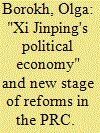

|
|
|
|
|
| Summary/Abstract |
The author examines the formation process and the essence of the concept of the "Xi Jinping's political economy," which became widespread at the end of 2015. Chinese interpretations of this concept are analyzed and the most significant theoretical innovations are singled out. Special attention is paid to the transformation of foreign concept and their adaptation in the system of "political economy of Chinese socialism."
|
|
|
|
|
|
|
|
|
|
|
|
|
|
|
|
| 2 |
ID:
130826
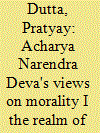

|
|
|
|
|
| Publication |
2014.
|
| Summary/Abstract |
Acharya Narendra Deva strongly believed that the Gandhian ideas based on morality and ethics could be the only solution to meet the basic needs of a society both developing and developed. It was thus that even after independence, he wielded the Gandhian weapon of Satyagraha most effectively to ?ght every form of injustice against the oppressed and the depressed in the then Indian society. Like Gandhi, he gave the highest priority for the removal of rural backwardness and he was in favour an innovative technology that could help in bringing an all round development in a developing society. He was a profound thinker who could analysis political, economic and social problems in their totality and his socio~political ideas about the solution to the problems facing the nation and society was exclusively original in its entirety. Narendra Deva accepted the value of morality and ethics of Gandhi and practised it fully throughout his whole life. It was Gandhi, who ?rst demonstrated the powerful effect on his countrymen of renouncing wealth for the sake of human service rather than personal salvation and Deva had trodden the same pathway into lndia's heart. Gandhi and Narendra Deva acquired their moral strength through renunciation, much as lndia's ancient sageswere supposed to obtain magical powers through their austerities. Their magic was singleness of purpose and an iron will. When Deva joined the Indian political
struggle under Gandhian leadership, the Mahatma once told him to simplify life and he took his words to heart. They never urged anyone else to follow their way of life and went their own way with a striking serenity. As a leading intellectual of outstanding mould, Acharya Narendra Deva had a forceful urge to bring about social justice, processed through a strong vein of idealism and always expressed deep concern for the down- trodden lndian masses. He remained a path?nder of the socialist movement in India and strongly believed that freedom was the first postulate for the establishment of the socialist society in India. He felt that without political independence the socialist programme could never become a reality. Narendra Deva always emphasized the moral and cultural elements of Marxism, but in the Indian socio-political context, he said that the class con?ict was already in existence and the real question was on whose side you were going to stand. Moreover, it was wrong to assume that the capitalist class had no vested interest in the freedom struggle. He, therefore, viewed that the socialists should create consciousness among labour, convince them that their interest would be well protected inn the freedom struggle and should broaden the base of that struggle by organizing the toilers. That is why; Gandhi and Deva wanted the historical stream of the cultural progress of India, in order to sustain the flow of continuity. In fact, Gandhi and Narendra Deva's entire socio-political ideas were ofa new social order purely based on universal love, ahimsa, morality and most importantly the role of ethics in Indian politics. Gandhi's ideal society was a non-violent and stateless society and repudiated state on ethical, historical and economic grounds. Unlike Marx, Gandhi and Deva persistently put emphasis on moral force and on the - realization of one's own self and there was no place for violence in their whole socio-political philosophy. The purpose ofthe article is to highlight the impact of ethics and morality on Narendra Deva's socio-political ideas and its relevance in the 21" century.
|
|
|
|
|
|
|
|
|
|
|
|
|
|
|
|
| 3 |
ID:
034567
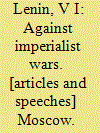

|
|
|
|
|
| Publication |
Moscow, Progress Publishers, 1966.
|
| Description |
376p.Hbk
|
|
|
|
|
|
|
|
|
|
|
|
Copies: C:1/I:0,R:0,Q:0
Circulation
| Accession# | Call# | Current Location | Status | Policy | Location |
| 032519 | 923.147/LEN 032519 | Main | On Shelf | General | |
|
|
|
|
| 4 |
ID:
069437
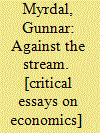

|
|
|
|
|
| Publication |
London, macmillan Press, 1972.
|
| Description |
x, 336p.
|
| Standard Number |
333165152
|
|
|
|
|
|
|
|
|
|
|
|
Copies: C:1/I:0,R:0,Q:0
Circulation
| Accession# | Call# | Current Location | Status | Policy | Location |
| 013511 | 330/MYR 013511 | Main | On Shelf | General | |
|
|
|
|
| 5 |
ID:
101307
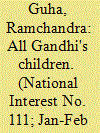

|
|
|
| 6 |
ID:
188818
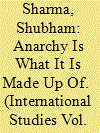

|
|
|
|
|
| Summary/Abstract |
In this article, I attempt to critically assess Kenneth Waltz’s deployment of the idea of anarchy to erect a ‘scientific theory of international politics’. First, I argue that the formation of a concept requires comprehension of the object from the standpoint of historical development, not a narrow reading of it. Second, I subject the thinner abstractions of self-help, balance of power and bandwagoning to the test of history. Third, I argue about mainstream international relations’ disdain for revolutions. I would posit that revolutions are fine templates which store rich agential history of structural transformation, a theme subject to much chagrin by realists of all hues, particularly neorealists. In doing so, I take the Bolshevik Revolution of 1917 as my benchmark. I elucidate that through the occlusion of first and second images, man and state, in the favour of third image, that is, structural anarchy, Waltz tends to ignore the role of agency as a conscious collective which could be best captured by the Bolshevik Revolution. In doing so, I rely on Perry Anderson’s three modes of agency in history. As a corrective to Waltz’s theorization, I make a strong case for class transcending both man and state as an organic category with immense potential of becoming a level of analysis which both acts upon the structure and refracts through it. I finally conclude by saying that anarchy was a condition and not a ‘social relation’ of any sort which could claim to constitute the ‘international’.
|
|
|
|
|
|
|
|
|
|
|
|
|
|
|
|
| 7 |
ID:
040176
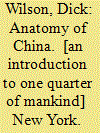

|
|
|
|
|
| Publication |
New York, Weybright and Talley, 1968.
|
| Description |
xii, 327p.hbk
|
|
|
|
|
|
|
|
|
|
|
|
Copies: C:1/I:0,R:0,Q:0
Circulation
| Accession# | Call# | Current Location | Status | Policy | Location |
| 000988 | 951/WIL 000988 | Main | On Shelf | General | |
|
|
|
|
| 8 |
ID:
166882
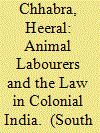

|
|
|
|
|
| Summary/Abstract |
This article is a tentative effort to highlight the symbiotic but systematically underrated position of animals in labour history. It argues for an expansion of human-centric definitions of labour to include non-human animals in this domain. The discussion focuses in later parts on colonial rule in India to examine debates about three colonial legislative enactments dealing with animals as labouring bodies in various capacities. Predictably, this colonial discourse and intervention remains human-centric, too. Yet, closer reading of such historical evidence also indicates exciting scope for developing various aspects of the ‘animal question’ in relation to labour history and South Asian studies.
|
|
|
|
|
|
|
|
|
|
|
|
|
|
|
|
| 9 |
ID:
123422


|
|
|
|
|
| Publication |
2013.
|
| Summary/Abstract |
According to Marxist view, society is always divided into two classes such as oppressor and oppressed, rich and poor, bourgeoisie and proletariat, capitalist and the workers class. Furthermore, industralisation emerged the exploitation and degraded condition of workers by the capitalist class.
|
|
|
|
|
|
|
|
|
|
|
|
|
|
|
|
| 10 |
ID:
029691
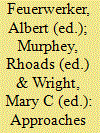

|
|
|
|
|
| Publication |
Berkeley, University of California Press, 1967.
|
| Description |
356p.hbk
|
|
|
|
|
|
|
|
|
|
|
|
Copies: C:1/I:0,R:0,Q:0
Circulation
| Accession# | Call# | Current Location | Status | Policy | Location |
| 002827 | 951.04/FEU 002827 | Main | On Shelf | General | |
|
|
|
|
| 11 |
ID:
163252
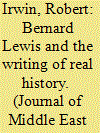

|
|
|
|
|
| Summary/Abstract |
Recent appraisals of Bernard Lewis’s career and scholarship have tended to neglect somewhat the research he carried out at London University’s School of Oriental African Studies (SOAS) before his move to Princeton in 1974. This early work resulted in important publications on Isma‘ilism, the Ottoman archives and modern Turkish history, but he also published highly influential books dealing with pre-modern Islamic history and culture. A survey of his early publications reveals certain recurring topics and preoccupations, including Isma‘ilism considered as a political and cultural revolution manqué, the potential dangers of a clash of civilizations, and Muslim responses to the challenges of modernization and Westernization. Lewis’s style and lucidity have contributed greatly to his influence as a historian.
|
|
|
|
|
|
|
|
|
|
|
|
|
|
|
|
| 12 |
ID:
045095
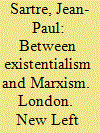

|
|
|
|
|
| Publication |
London, New Left Review, 1974.
|
| Description |
302p.
|
|
|
|
|
|
|
|
|
|
|
|
Copies: C:1/I:0,R:0,Q:0
Circulation
| Accession# | Call# | Current Location | Status | Policy | Location |
| 016025 | 320.092/SAR 016025 | Main | On Shelf | General | |
|
|
|
|
| 13 |
ID:
151638
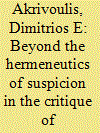

|
|
|
|
|
| Summary/Abstract |
Realist and Marxist critiques of humanitarian intervention are distinctively materialistic in scope. The IR literature has already described this scepticism as a ‘hermeneutics of suspicion’, a term associated with the work of Paul Ricoeur, which aims to unearth the intervenors’ material and geopolitical interests hypocritically hidden behind the pretext of humanitarianism. The article first notes the decontextualised misappropriations of the term as an iconic and omnipotent instrument of doubt, as well as the limitations of the social constructivist response on the matter. By contextualising Ricoeur’s hermeneutics of suspicion as developed in his life work, the article then calls for an extension of critique from a hermeneutics of suspicion to a hermeneutics of naïveté. Applied in the critique of the ideology of humanitarian intervention, the article thus calls for a shift of focus from the examination of the distorting (Marxism, realism) and legitimising (social constructivism) functions of this ideology to its integrating function that has allowed the evocation of humanitarian principles as international norms, and uncritically vindicates this arrangement. The article proposes that this hermeneutical detour could allow critique to proceed to a greater analytical depth, opening up a set of critical questions.
|
|
|
|
|
|
|
|
|
|
|
|
|
|
|
|
| 14 |
ID:
142828
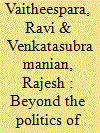

|
|
|
|
|
| Summary/Abstract |
Wedged uncomfortably between the gathering pan-Indian nationalist movement and the locally resonant and divisive anti-Brahman, Tamil ethno-nationalist movement, Left leaders in the Tamil region in India were faced with a difficult and complex set of political choices and challenges in the early twentieth century. These political challenges brought to the fore the social and political contradictions between an anti-colonial Indian nationalism led mostly by upper-caste liberal–bourgeois leaders and an equally entrenched and locally resonant ethno-nationalist movement which, despite its social reformist and anti-Brahman platform, was led by dominant non-Brahman caste leaders committed to the continuation of British rule. In this paper, we will be looking at two of the most prominent Tamil Left leaders who attempted to work with and bridge these contradictory movements in Tamil society. M. Singaravelu (1860–1946) and P. Jeevanandam (1907–63) were prominent Left leaders and intellectuals in the Tamil region and were well known for their close engagement with and sensitivity to issues of social reform, caste and linguistic and cultural hegemony. Both joined various political movements including the Indian National Congress, the Dravidian movement and the Indian communist party in different phases of their careers. It is their participation and engagement with such diverse and contradictory movements that make their intellectual interventions unique and a close study of their work valuable for providing a window into how the Left attempted to deal with such thorny issues as the politics of caste and language in India.
|
|
|
|
|
|
|
|
|
|
|
|
|
|
|
|
| 15 |
ID:
158722
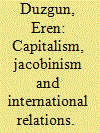

|
|
|
|
|
| Summary/Abstract |
Debates over ‘modernity’ have been central to the development of historical-sociological approaches to International Relations (IR). Within the bourgeoning subfield of International Historical Sociology (IHS), much work has been done to formulate a historically dynamic conception of international relations, which is then used to undermine unilinear conceptions of global modernity. Nevertheless, this article argues that IHS has not proceeded far enough in successfully remedying the problem of unilinearism. The problem remains that historical narratives, informed by IHS, tend to transhistoricise capitalism, which, in turn, obscures the generative nature of international relations, as well as the fundamental heterogeneity of diverging paths to modernity both within and beyond western Europe. Based on the theory of Uneven and Combined Development, Political Marxism, and Robbie Shilliam’s discussion of ‘Jacobinism’, this article first reinterprets the radical multilinearity of modernity within western Europe, and then utilises this reinterpretation to provide a new reading of the Ottoman path to modernity (1839–1918). Such a historical critique and reconstruction will highlight the significance of Jacobinism for a more accurate theorisation of the origin and development of the modern international order, hence contributing to a deeper understanding of the international relations of modernity.
|
|
|
|
|
|
|
|
|
|
|
|
|
|
|
|
| 16 |
ID:
111303
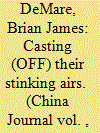

|
|
|
| 17 |
ID:
038691
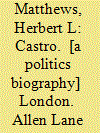

|
|
|
|
|
| Publication |
London, Allen Lane the Penguin press, 1969.
|
| Description |
325p.Hbk
|
| Contents |
Includes bibliography, index.
|
|
|
|
|
|
|
|
|
|
|
|
Copies: C:1/I:0,R:0,Q:0
Circulation
| Accession# | Call# | Current Location | Status | Policy | Location |
| 003137 | 923.17291/MAT 003137 | Main | On Shelf | General | |
|
|
|
|
| 18 |
ID:
045198
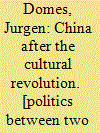

|
|
|
|
|
| Publication |
London, C Hurst and company, 1975.
|
| Description |
xii, 283p.: tableshbk
|
| Standard Number |
0903983435
|
|
|
|
|
|
|
|
|
|
|
|
Copies: C:1/I:0,R:0,Q:0
Circulation
| Accession# | Call# | Current Location | Status | Policy | Location |
| 017011 | 951.05/DOM 017011 | Main | On Shelf | General | |
|
|
|
|
| 19 |
ID:
148268
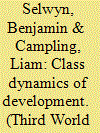

|
|
|
|
|
| Summary/Abstract |
This article argues that class relations are constitutive of development processes and central to understanding inequality within and between countries. Class is conceived as arising out of exploitative social relations of production, but is formulated through and expressed by multiple determinations. The article illustrates and explains the diversity of forms of class relations, and the ways in which they interplay with other social relations of dominance and subordination, such as gender and ethnicity. This is part of a wider project to revitalise class analysis in the study of development problems and experiences.
|
|
|
|
|
|
|
|
|
|
|
|
|
|
|
|
| 20 |
ID:
114223
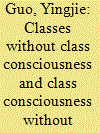

|
|
|
|
|
| Publication |
2012.
|
| Summary/Abstract |
The meaning of class, like many other things, is conferred by historically specific chains of signification or discourses that constitute the identity and significance of class as a social reality. Therefore, much of the conceptual purchase and explanatory power of class will be lost when the concept is taken out of the theories in which it is embedded. This is exactly the case with the use of class in the People's Republic of China in the last two or three decades, when the Marxist approach to class has been rejected and 'forgotten' by the social analysts and the Chinese Communist Party-even though the latter continues to pay lip service to Marxism-in favour of alternative concepts, methodologies and theories that sidestep class relations. The point of departure here is not so much sociological as political-ideological.
|
|
|
|
|
|
|
|
|
|
|
|
|
|
|
|
|
|
|
|
|